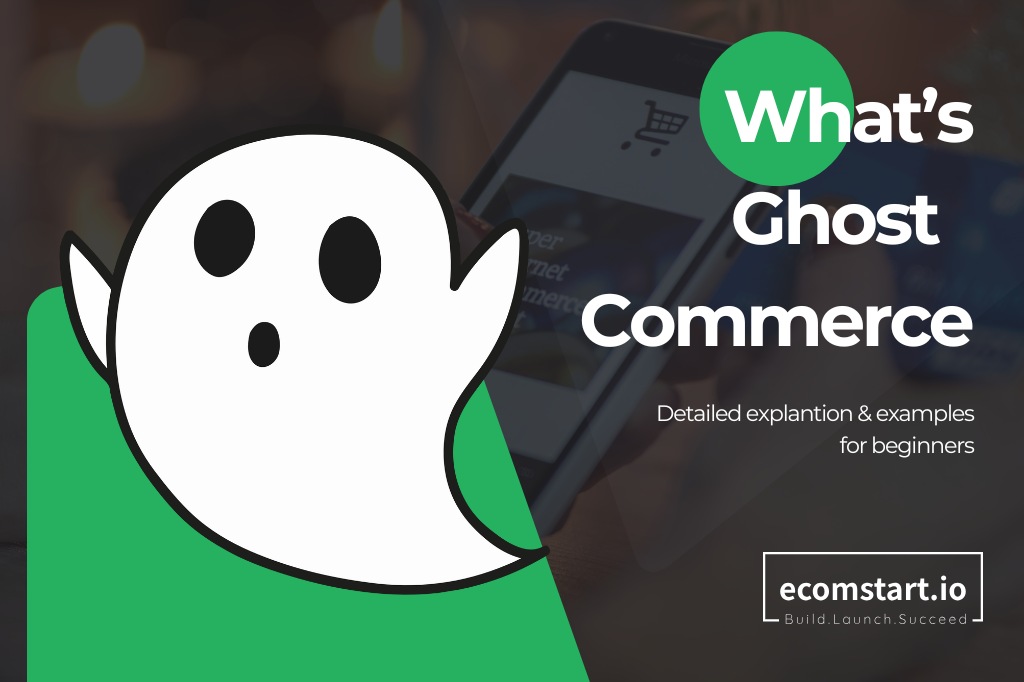What is Ghost Commerce? An Explanation for Beginners [2024]

Have you ever heard of the concept of ghost commerce?
Or have you ever searched for what is ghost commerce but are too confused with messy data on the internet?
If so, don’t worry. We are here to help you take it easy to explore the definition and key characteristics of ghost commerce, as well as how to start your business journey with ghost commerce.
Now, let’s take a deep breath and explore this detailed guide!
1. What’s ghost commerce?
As a relatively new and dynamic trend in the business landscape, it’s not easy to define the exact meaning of “ghost commerce” without a particular context or specific usage.
Simply speaking, ghost commerce can be understood as a form of eCommerce where the sellers work with suppliers to fulfill orders directly to customers while they do not have a physical storefront or inventory.
In other words, in general, ghost commerce is when you build your brand and monetize it by selling other people’s products.

Until today, when searching “what is ghost commerce” on the internet, you will see that it is a controversial topic. Some people agree that it is dropshipping. Some people think that it’s just another word for affiliate marketing.
However, when taking an overview of the entire market, the question “ghost commerce what is it” can be answered as it is a method sharing certain similarities with dropshipping, influencer marketing, and affiliate marketing as well.
It includes any way to make money with your brand that doesn’t require that you create your own products or services. Let’s see what the minor differences here are.
When comparing ghost commerce vs affiliate marketing, while ghost commerce focuses on building and monetizing a brand, affiliate marketing aims to promote other companies’ products and then earn commissions.
When looking at the differences between ghost commerce vs dropshipping, ghost commerce businesses put their core values on curated products and brand identity, but the main task of dropshipping is to offer a diverse product playground under a generic brand.
As a relatively new term, how to define whether a business is ghost commerce or not is still a confusing question. For example, when referring to the ASOS brand, it might share some ghost commerce qualities. It selects products from other suppliers and sells them under the ASOS brand, which helps it build a recognizable and strong brand identity.

But does the ASOS brand really follow the ghost commerce concept?
Although ASOS controls production and branding, it focuses on creating sales from third-party platforms like their app or other retailers instead of from their website. Besides, ASOS will manage its own inventory while normally, ghost commerce business will outsource this task to third-party logistic providers.
Its business model includes characteristics of traditional wholesale buying with elements of private label production.
In other words, we can find some aspects of ghost commerce in ASOS, but it should be categorized as a hybrid retailer.
To conclude, from this example, we can see that some key takeaways when it comes to ghost commerce meaning include:
- Use an online presence to market your products and services without taking ownership
- Focus on building brand identity
- Organize and sell well-selected products that target an specific audience and resonate with its brand
- Be characterized by anonymity, customization, and scalability
- Not involved in product creation, inventory holding, warehouse management, or logistics
- Offer exceptional and personalized customer services
2. Ghost commerce vs eCommerce: What is the difference?
After getting ghost commerce explained, let’s break down the differences between ghost commerce and eCommerce.
Simply put, eCommerce or electronic commerce refers to the term in which products are being sold and bought over the Internet. It also involves exchanging data related to prices and inventory as well as completing online transactions like payments.

The important keywords in the eCommerce and ghost commerce definition are extremely different.
While ghost commerce transactions do not involve the investment in inventory or shipping, eCommerce brands might take responsibility for these steps depending on the way a business works. eCommerce is defined by the platform of trading activities (on the internet), not by the presence of product creation or warehouse management like ghost commerce.
In many cases, ghost commerce can be said to be a strategy in eCommerce when most of the activities in ghost commerce take place on an online platform.
3. How does ghost commerce work?

If you are researching how to start ghost commerce for beginners, you can follow these simple steps:
3.1. Research and choose your right niche
It is essential to conduct research and make the last decision on a niche that your business will be working on. It should be in high demand but not oversaturated.
3.2. Find the right supplier
It will be your task to collaborate with a reliable supplier, who can provide you with highly qualified products.
3.3. Set up an online presence
In the realm of ghost commerce, it becomes crucial to enhance your online visibility. You should cultivate a dedicated community and establish trust among your target audience. Convincing them to value your opinions is essential.
You can create your own website effortlessly with Shopify. This user-friendly platform offers customizable templates and a simple drag-and-drop interface, making it easy for anyone to build a professional and visually appealing webpage. Whether you’re just starting or looking to expand your online presence, Shopify provides a comprehensive solution to bring your vision to life on the digital stage.
Moreover, on platforms like Facebook, Instagram, or TikTok, you, as an influencer, can become a promoter. Use your social media influence to guide your followers to affiliate links, product recommendations, or alternative eCommerce stores. In this role, you bridge the gap between consumers and various shopping options, diversifying your income while providing personalized advice.
Your authenticity and trust matter, establishing a genuine connection with your audience for successful collaborations in the evolving eCommerce landscape.
3.4. Build a strong brand identity
A typical characteristic of ghost commerce is the importance of brand identity.
Once you have an online presence, your ghost commerce brand needs an identity that will set you apart from your competitors and establish a connection in the customers’ minds.
This is typically done through a combination of search engine optimization (SEO), email marketing, paid ads, and social media. Just try out everything and find the best marketing strategy for your ghost commerce brand.
3.5. Provide excellent customer service
To offer the best shopping experiences, make sure that you and your team always respond promptly to customer inquiries and complaints.
4. Examples of ghost commerce
4.1. Famous Footwear
You can find at this store many famous shoes from your top-picked brands, including Nikes, New Balance, and Converse. It is working well and smoothly on Amazon marketplace by outsourcing order processing and shipping to third-party logistics providers.
Besides, this business has its own website to build its brand identity better, which can showcase their brand personality and values.
4.2. The perfume shop
This online store is about to provide you with an array of perfume collections from different top-notch brands like Chanel, Dior, Gucci, Armani, and so on. You can find here all major designer fragrance brands, classic and celebrity perfumes, aftershaves, and body products.
They will leverage partnerships with external providers to manage order fulfillment and make sure that their customers will have the best shopping journey. With these exceptional services and effective marketing strategies, The perfume shop can enhance its brand appeal.

4.3. Myntra
This ghost commerce brand will offer you a superior shopping experience where you can immerse yourself in the world of the top-picked clothing brands, for instance, Van Heusen, Campus, House of Pataudi, etc.
Myntra is going to become a familiar destination for online shoppers with its excellent customer service and highly qualified curated products. Besides, they are in collaboration with third-party logistics providers for various aspects of fulfillment to support their customers better.
From these examples of ghost commerce, you can see that there are many forms of ghost commerce available for you to get started.
5. Pros & cons of ghost commerce
5.1. Pros
- Low start-up costs: Unlike brick-and-mortar stores or regular e-commerce businesses, you don’t need a physical warehouse to store your products.
- Scalability: You can easily scale your business without having to worry about inventory management.
- A wide range of products: Once your store is set up, you can feature as many products as you want as long as it makes sense for them to feature in your store. If your suppliers have these items in stock, you can list them for sale on your site at no cost.
5.2. Cons
- Thin profit margins: Since you don’t handle the product at all, you have little room to upsell or start trying to add discount bundles.
- Highly competitive: Unless you’re in a very specific niche, chances are that the market is overcrowded. Your products will have to compete against a lot of other people selling similar items and it’s harder to stand out on a market when you don’t have much control over your product.
- Over-reliance on partners: Since you don’t have the product, you must always rely on your partners to supply it and pray that they are always well stocked.
6. Is ghost commerce profitable?
Ghost commerce, like other forms in this industry, can be extremely profitable.
It’s all about picking a niche, fully understanding it, and understanding the target audience.

Do you know it?
80% of businesses fail in the first couple of years, and only 3% last longer than five years. These stats are also for any ghost commerce business.
Ultimately, how to make money with ghost commerce?
The profitability of a ghost commerce business depends on your ability to navigate the challenges, select the right products and suppliers, build your brand identity, and execute customer service strategies. While ghost commerce can be profitable for some, success often requires dedication, adaptability, and a thorough understanding of your target market.
7. Is ghost commerce legit?
So, simply speaking, you create a webpage, research the offers of suppliers to fill your store with the best possible goods, attract clients, and offer them your products. After completing their orders, your buyers receive the packages with the purchased items, and you get your money – everybody is happy! Your profit here is the difference between the original price set by the product supplier and the increased price you’ve set in your store.

This is how ghost commerce works. Is there something wrong or illegal with this scheme? Obviously not.
That’s why there are so many websites on the Internet related to ghost commerce and nobody blocks them. If this kind of business was illegal, it would be hard to find any valuable information about it.
Thus, it is absolutely legal to build your own websites to run a ghost commerce business.
8. The future of ghost commerce: is it right for you?
When it comes to the last words of ghost commerce, we believe that you catch a glimpse of how does ghost commerce work, some types of ghost commerce jobs, and how it brings you passive income.
And ghost commerce is legit and profitable.
Obviously, it will continue to develop in the future. Ghost commerce is still a new concept, but we believe its definition, insights, and resources will be updated more and more soon.
If you could find a product you are passionate about and then market it to people who are passionate about your product, then why don’t you get started with ghost commerce?

However, if you just hear things like “financially free, passive income, no knowledge required” without a step-by-step guide or detailed tutorial, please be careful.
As we discussed before, while ghost commerce can be appealing due to the reduced upfront costs and logistics, it still requires active involvement in marketing and customer service to drive sales and maintain profitability.
Achieving true passivity may be challenging, but with effective strategies and continuous optimization, it is possible to build profitable and relatively hands-off income streams with ghost commerce.
If you are ready for it, then yes, ghost commerce can be your thing and your future from today.
9. Conclusion
In summary, we hope that this article can help you answer some common questions like what is ghost commerce, how it works to make money, is ghost commerce legit, or what are the differences between ghost commerce vs eCommerce.
If you are interested in this new concept, just explore our eComStart resources and guidelines to have a great kickstart!


